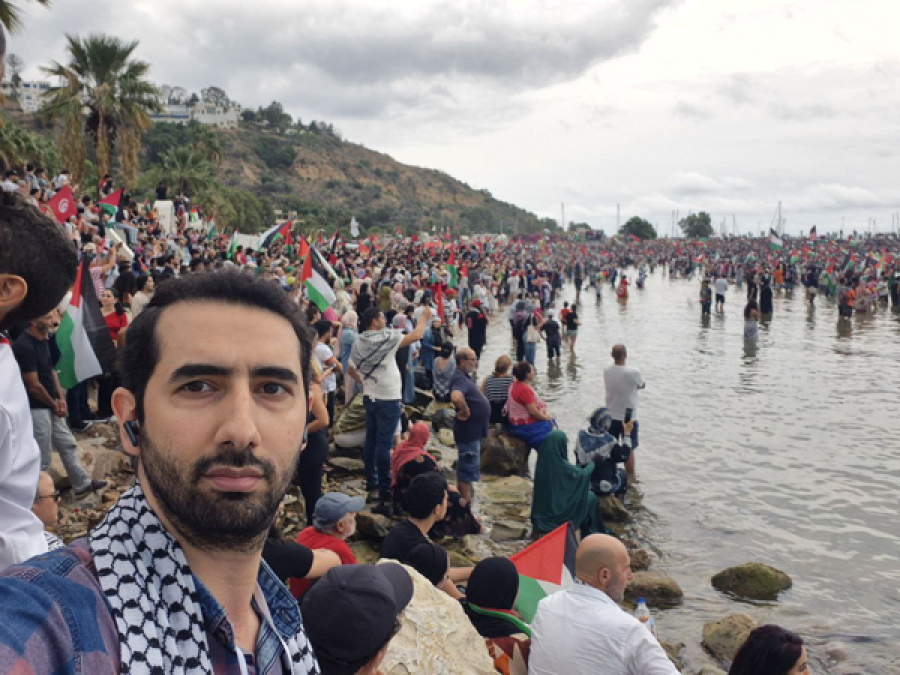The “Samoud” Caravan is a modern epic that each of its members has joined with a personal narrative from a corner of the world. With their passionate presence, they broke the silence of governments against the Zionist regime’s oppression of the people of Gaza.
Fars News Agency Culture Group; Sometimes the sea is not just water and waves. Sometimes it is a symbol of dreams, of efforts, and of a will that is not willing to bow down to oppression. These days, on the shores of the Mediterranean, the Tunisian Sea is hosting an unprecedented effort to break a siege. A siege that has numbered Gaza’s soul. From afar, amidst the roar of the waves, small boats can be seen preparing for a great mission; the Global Samood Caravan.
This caravan has come not with weapons but with solidarity and humanity to show the world that Gaza is not alone. But this journey is not easy. Ali Akbar Sayah Taheri, an international media activist and Palestine expert, tells the story behind the scenes of this movement, not as one of the passengers, but as a narrator and analyst who witnessed this great effort firsthand. A story of delay, challenge, determination and resistance.
The idea of forming the “Samoud” caravan arose from a deep understanding of the humanitarian crisis in Gaza. Social activists from all over the world, especially from Spain to Italy, decided to break the naval blockade of Gaza using boats and small ships. This movement is a symbol of the people’s determination to act, where governments have remained silent. The caravan started its journey from Spain and was later joined by other ships from Tunisia and Italy. “When 17 ships set sail from the port of Sicily in southern Italy for international waters, joined by 20 more from Tunisia, I felt like a great people’s force was forming,” says Sayyah Taheri. “In total, 39 small and large ships are now on the water, all moving towards a common goal: breaking the siege on Gaza.”
This is not a simple sea excursion. It is a journey full of unforeseen obstacles. The journey from Tunisia to the occupied territories is itself a long and risky journey, lasting 12 to 15 days. The length of the journey created numerous challenges from the very beginning.
Reasons for the delay of the Samood convoy
The first reason for the delay was so simple and devastating that no one thought of it: unfavorable weather conditions. The boats in this convoy were neither giant merchant ships nor warships. They were small boats equipped by volunteers and social activists for a humanitarian mission.
For this reason, they were unable to cope with severe sea turbulence and unforeseen storms. Sayyah Taheri says in a descriptive tone: “Some of these boats took five days to complete a three-day journey. At any moment, a storm could overturn them in the middle of the sea.” This not only caused delays, but also posed a great danger to the lives of the members of the convoy.
In addition, technical problems accompanied them from Spain to Tunisia. Two ships were damaged in an Israeli drone attack and needed major repairs. These boats were built by different companies, and finding spare parts for safety equipment in the middle of the road and far from the manufacturing companies was a laborious and time-consuming task. “Each of these boats had a different ID card, and coordinating repairs for them was a complex logistical project that took up a lot of time for the convoy,” the media activist says.
But the biggest challenge was finding skilled manpower. The trip requires experienced captains, crew, and sailors to guide the boats on the long and dangerous journey from Tunisia to the occupied territories. But the volunteers in the convoy were mostly social activists and ordinary people who had no knowledge of navigation. Finding skilled manpower was also not an easy task, because they knew that they might get into trouble with Israel on this trip. “This is not a normal trip. There is conflict and the risk of attacks by the Zionist regime. Therefore, finding people who are willing to take this risk was a big challenge.” This also served as an excuse for another reason for the delay: the fear of attacks by the Zionist regime among some Europeans.
Maryam Sadat Ajoudani

